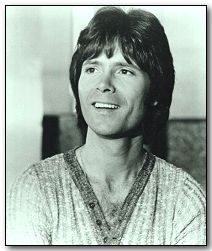 Cliff Richard (UK) |
 Cliff Richard (UK) |
Small Corners EMI 1978
One of Britain's top pop legends produces a gospel album. Good news? Well - not totally. Let's start with the good bits. First of all, it was incredibly brave of Cliff to release such an album at that point in his career. From the late 60s into the 70's, Cliff had been in a bit of a slump, being more regarded as a "family entertainer" than a pop singer. A couple of hit singles had begun to change that again, but his recovery of pop credibility was still somewhat fragile, and an overtly Christian album threatened to blow it to smithereens.Secondly, without doubt this album introduced a lot of non-Christians to good Christian songs, with clear and challenging lyrics. Many people bought it because it was Cliff, regardless of the fact that it was a Christian record. You see, it wasn't that the album itself was actually BAD - just not as good as it could have been.
Three Larry Norman songs, two from Annie Herring, and one each from Randy Stonehill and Malcolm & Alwyn - how could you go wrong? Well, Cliff's selection of songs was not fully inspired. Out of all the great songs on "Welcome to Paradise", "I've got news for you" was hardly the obvious choice for a cover. M&A's "Wildwall" album was also packed with great songs, but "I Love" wasn't one of them ("I love St Judy's Comet. I love to break bread - I get a blessing from it"? C'mon!)

And if the choice of songs could be questioned, Cliff's interpretation certainly left something to be desired. He could have gotten away with "I Love" and "I've got news for you" if he had shown that they had unsuspected depths. Unfortunately, his covers tended to emphasise their plainness. Larry Norman didn't escape either - "Why should the devil..." loses all its infectious high-octane pizazz, which is replaced by a transparently artificial energy. The rebellious teenager lyrics also sounded rather strained coming from someone reknowned for being clean-cut and well-behaved.
Whilst all the above were good-to-moderate songs, "Good on the Sally Army" was just plain schmaltzy.
Having failed to make the most of the best of current Christian songwriters, it is ironic that the best track on the album by a long way was written by his own guitarist, Terry Brittan. "Yes, He Lives" stands out - catchy and committed. Oh, that the rest of the album were like that...
It isn't that Cliff couldn't do the business. A later Christian album, "Now You See It... Now You Don't" (1982), proved that he could. Full of good songs, and well-produced, it generated two well-deserved hit singles in the UK and proved once and for all to a cynical secular music industry that the Devil DIDN'T have all the good music. DC